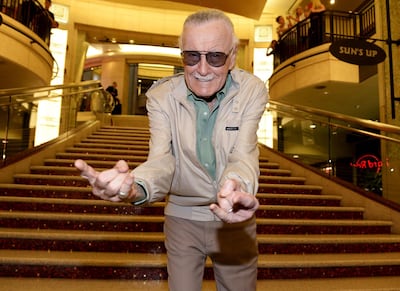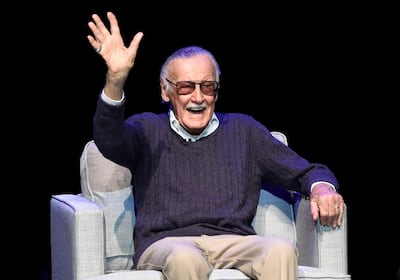Stan Lee needs little introduction.
But by way of a brief recap, the Marvel visionary, who died in 2018, created some of the best-known characters in modern pop culture, including Spider-Man, the Hulk, the X-Men and the Fantastic Four. He landed his debut writing credit on 1941’s Captain America #3, and his final was a posthumous credit for his cameo in 2019's Avengers: Endgame, then the highest-grossing film in history, which was released six months after his death aged 95.
With the documentary Stan Lee, which has its premiere at the Tribeca Film Festival on Friday, director David Gelb hopes to unmask the man behind the comics and cameos. Lee is the highest-grossing “actor” ever, having appeared in 51 cameos, despite rarely being on screen for more than a few seconds.
Gelb tells Lee's story through archival footage and, of course, comic book panels. He also employs clay models, which are quirky initially, but lose the novelty. Some claymation might have helped, though budgetary or time constraints could have been a factor – the film was only announced on what would have been Lee’s 100th birthday on December 28 last year.
The film's narrator for the most part is Lee himself, with deftly edited audio taking us through his childhood in New York and first foray into comics when, aged 17, he landed a job as an office assistant at Marvel forerunner Timely Comics in 1939.
Lee was soon involved on the creative side at the understaffed publisher, but it looked like his comics career would be over when the US entered the Second World War. Upon enlisting in the army, however, he was appointed "playwright," thanks to his employment history. It was a loose description – his first job was rewriting the training manual for financial controllers.

The speed at which war had broken out had left the army’s accountants severely under-resourced, and soldiers weren’t being paid. Lee found that by adopting a comic book style for the manual, training took six weeks, not six months. A lesson was learnt: comic books could be so much more.
Thus, we learn, sprang Lee’s lifelong obsession that comics should educate as well as entertain. He wanted to write about real people, with problems and fears, not one-dimensional heroes. His publishers later were unconvinced, so he slipped Spider-Man – a teenager with girl troubles, an overbearing aunt, and a worrying naivety about the real world – out through the back door in 1962 in an already cancelled comic.
It was a hit, and soon his editorial freedom was assured.
Lee would later give us female superheroes, black superheroes and supervillains who maybe had a point, all while his competitors continued churning out chisel-jawed, all-American cliches, and the sales kept rising.
It wasn’t all living the dream, however. The film details how in 1972 Lee was promoted to publisher, a role for which he was unequivocally unsuited. He could no longer write the comics he loved, so he toured the world talking about them rather than busying himself with the accounts and minutiae his role required, much to the board’s dismay.

Through the '80s and '90s, Lee became increasingly estranged from Marvel, despite an honorary chairmanship, and it’s a shame the film entirely glosses over this period. In 2001 Lee even wrote his first comic for arch-rival DC, which had stolen Marvel’s comics-with-a-conscience crown, while Marvel sailed constantly close to bankruptcy.
It would have been fascinating to hear Lee’s thoughts on this era, in which the brand he created and held so dear almost imploded.
The film doesn’t entirely avoid tricky subjects, though. We’re treated to an explosive phone exchange between Lee and his collaborator-in-chief since the Timely Comics days, artist Jack Kirby. Kirby left Marvel in 1970, essentially over a huge clash of egos about who really created Spider-Man – artist or writer. The exchange doesn’t answer the question, but gives an insight into the strains beneath the surface of Marvel’s golden 1960s era.
Stan Lee isn’t quite warts and all. The legal wrangles and misconduct allegations are sidestepped, too. But it’s an intriguing history that fans will love, and followers of cultural history will appreciate.
As for the big question: Yes, there is a highlights reel of some of Lee’s best cameos in 40-plus years of Marvel on screen.

